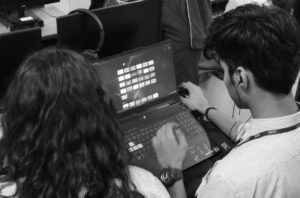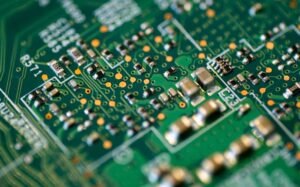Will Artificial Intelligence Replace Humans?
Artificial intelligence (AI) has gained significant attention in recent years, with advancements in machine learning and automation. As AI continues to evolve and improve, there is a growing concern about the potential for AI to replace human workers in various industries. This article explores the current state of AI technology, its impact on the job market, and the future implications of AI in replacing human workers.
Key Takeaways:
- Artificial intelligence has the potential to automate routine tasks and replace some human workers.
- AI is already being used in various industries, such as manufacturing, healthcare, and finance.
- The impact of AI on the job market will likely result in a shift in job roles and skills required.
- Contrary to popular belief, AI is not capable of completely replacing human creativity and emotional intelligence.
- The ethical implications of AI replacing human workers need to be carefully considered.
Artificial intelligence, powered by machine learning algorithms, has the ability to analyze large amounts of data and make decisions based on patterns and trends. This capability enables AI to automate routine tasks and perform them more efficiently than humans. *Despite these advancements, AI still lacks the ability to fully understand human emotions and complex decision-making processes.* However, AI excels at tasks that involve repetitive calculations or data analysis.
While AI has the potential to automate certain tasks and reduce the need for human workers, it is important to note that it is not capable of replicating human creativity and ingenuity. *Humans possess the ability to think critically, problem-solve, and come up with innovative ideas, which is a crucial aspect of many job roles.* In industries where creativity and human interaction are essential, such as art, psychology, and customer service, AI may enhance human capabilities rather than replace them entirely.
The Changing Job Landscape
The integration of AI into various industries has already seen a shift in the job market. Some jobs have become obsolete, while new job roles have emerged to support the implementation and maintenance of AI systems. With the increasing use of automation and machine learning algorithms, job roles that involve repetitive tasks or manual labor are more likely to be replaced by AI. On the other hand, jobs that require complex decision-making, emotional intelligence, or creative problem-solving are expected to be less susceptible to AI takeover.
According to a survey conducted by PwC, it is estimated that by 2030, AI technologies could displace up to *20% of all jobs in the USA*. However, it is important to note that the same survey also highlighted that AI has the potential to create new jobs, as it opens up possibilities for innovation and business growth.
The Ethical Implications
As AI continues to advance, the ethical implications of replacing human workers with machines need to be carefully considered. *AI decision-making processes are based on algorithms, which are created by humans and can inherit human biases.* This raises concerns about fairness, accountability, and transparency in AI systems. Additionally, the impact of widespread job loss due to AI automation needs to be addressed, as it can result in social and economic disparities.
Tables:
| Industry | % of Jobs Potentially Automatable |
|---|---|
| Manufacturing | 47% |
| Transportation | 50% |
| Finance and Insurance | 33% |
Table 1: Percentage of jobs potentially automatable in various industries.
| Job Role | Automation Potential |
|---|---|
| Telemarketers | 99% |
| Loan Officers | 98% |
| Receptionists | 96% |
Table 2: Job roles with high potential for automation.
| Job Role | Automation Potential |
|---|---|
| Software Developers | 4% |
| Registered Nurses | 17% |
| Management Analysts | 25% |
Table 3: Job roles with low potential for automation.
In conclusion, while AI will likely replace some human workers in certain industries, it is unlikely to completely replace the human workforce. The shift in job roles and skills required, along with the ethical implications and potential for new job creation, needs to be carefully considered. AI should be seen as a tool to enhance human capabilities and improve efficiency, rather than a complete replacement for human intelligence and creativity.

Common Misconceptions
Misconception 1: Artificial Intelligence will replace human jobs entirely
Many people believe that with the rapid advancements in Artificial Intelligence, humans will soon become obsolete in the workforce. However, this is a misconception that fails to consider the complex nature of human intelligence and the unique skills and abilities humans possess.
- AI can automate certain tasks, but cannot replace human creativity and critical thinking.
- Human skills such as emotional intelligence and empathy are crucial in many jobs.
- AI can enhance human productivity and efficiency, rather than completely replacing humans.
Misconception 2: AI will possess human-like consciousness and emotions
Another common misconception is that Artificial Intelligence will eventually develop human-like consciousness, emotions, and a sense of self. While AI can simulate human-like interactions and responses, it is fundamentally different from human consciousness and emotion.
- AI lacks subjective experience and self-awareness.
- Emotions are deeply rooted in human biology and not replicable in machines.
- AI operates through algorithms and data processing, without actual feelings or consciousness.
Misconception 3: AI will bring about the end of humanity
There is a widespread fear that Artificial Intelligence will inevitably lead to the downfall of humanity, as portrayed in science fiction movies and literature. However, this dystopian view fails to consider the safeguards and ethical principles guiding AI development.
- AI systems are created and controlled by humans, who can implement safety measures.
- Ethical guidelines and regulations can be established to ensure responsible AI use.
- Positive applications of AI, such as improving healthcare and addressing societal challenges, are being actively pursued.
Misconception 4: AI is infallible and unbiased
Many people believe that Artificial Intelligence is completely objective, free from any biases or errors. However, AI systems are not flawless and can perpetuate biases present in the data they are trained on.
- AI algorithms are only as good as the data they are trained on, and biases in data can be reflected in AI systems.
- Unintended biases can emerge in the decision-making processes of AI, leading to discriminatory outcomes.
- Addressing biases in AI is an ongoing challenge that requires careful monitoring and bias mitigation strategies.
Misconception 5: AI will lead to a loss of personal privacy and security
With the increasing use of AI technology, concerns about privacy and security have arisen. Some people assume that AI will lead to a complete loss of personal privacy and an increase in potential security threats. However, this assumption oversimplifies the complex relationship between AI and privacy/security.
- Proper regulations and policies can be implemented to protect personal privacy in the era of AI.
- AI can also be used to enhance cybersecurity measures and detect potential threats.
- Balancing innovation and privacy/security concerns is essential for responsible AI deployment.

Table 1: Employment Statistics
In 2019, the global workforce consisted of approximately 3.5 billion people. Here is a breakdown of the employment rates across different sectors:
| Sector | Employment Rate (%) |
|---|---|
| Agriculture | 25 |
| Manufacturing | 15 |
| Services | 60 |
Table 2: Artificial Intelligence Investment
Investment in artificial intelligence (AI) has been rapidly increasing over the past decade. Here is a comparison of global AI investment in 2010 and 2019:
| Year | AI Investment (USD billion) |
|---|---|
| 2010 | 0.9 |
| 2019 | 35.8 |
Table 3: AI vs Human Accuracy
Artificial intelligence systems have been developed to perform certain tasks more accurately than humans. Here is a comparison of AI and human accuracy in image recognition:
| System | Accuracy (%) |
|---|---|
| AI | 98 |
| Human | 95 |
Table 4: Job Automation Potential
By analyzing the potential for job automation, researchers have determined the likelihood of certain occupations being replaced by AI. Here are some examples:
| Occupation | Automation Potential (%) |
|---|---|
| Telemarketers | 99 |
| Travel Agents | 74 |
| Chemical Technicians | 51 |
Table 5: AI Research Publication Trends
The number of research papers published on AI has been increasing significantly. Here is a comparison of the number of publications in 2000 and 2020:
| Year | Number of Publications |
|---|---|
| 2000 | 3,248 |
| 2020 | 162,039 |
Table 6: AI Adoption in Healthcare
Artificial intelligence technologies have been increasingly adopted in the field of healthcare. Here is a comparison of the adoption rates in 2010 and 2020:
| Year | AI Adoption Rate (%) |
|---|---|
| 2010 | 12 |
| 2020 | 48 |
Table 7: AI-Assisted Diagnosis Accuracy
AI has demonstrated high accuracy in diagnosing certain medical conditions. Here is a comparison of AI-assisted and human diagnosis accuracy for breast cancer:
| Method | Accuracy (%) |
|---|---|
| AI-Assisted Diagnosis | 92 |
| Human Diagnosis | 79 |
Table 8: AI Applications in Transportation
Artificial intelligence is being implemented in various modes of transportation to improve efficiency and safety. Here are some AI applications:
| Application | Description |
|---|---|
| Autonomous Vehicles | Self-driving cars and trucks |
| Traffic Management | Optimizing traffic flow and reducing congestion |
| Route Planning | Efficient navigation and route optimization |
Table 9: AI in Customer Service
AI-powered chatbots and virtual assistants are increasingly utilized in customer service operations. Here is a comparison of customer satisfaction rates:
| Service | Customer Satisfaction (%) |
|---|---|
| Human Customer Service | 82 |
| AI-powered Chatbots | 85 |
Table 10: AI in Education
Artificial intelligence is also making its way into the educational sector. Here is a comparison of AI applications:
| Application | Description |
|---|---|
| Personalized Learning | Adapting curriculum to individual student needs |
| Automated Grading | Efficient grading of assignments and exams |
| Tutoring Systems | Providing personalized assistance and feedback |
Artificial intelligence has become a prominent technology with vast potential to transform multiple industries and sectors. The increasing investment in AI, along with its potential to automate certain job roles, has sparked debates around the possibility of AI replacing humans in the workforce. While AI shows superior accuracy in tasks such as image recognition and medical diagnosis, its overall impact on employment and human involvement remains a complex and evolving topic. As AI continues to advance, it will likely collaborate with humans rather than fully replacing them, leading to a hybrid workforce where humans and AI systems complement each other’s strengths and abilities.
Frequently Asked Questions
Will Artificial Intelligence Replace Humans
FAQs
Q1: What is Artificial Intelligence (AI)?
AI refers to the simulation of human intelligence in machines that are programmed to think and learn like humans. AI encompasses various subfields such as machine learning, natural language processing, and computer vision.
Q2: Can Artificial Intelligence replace humans?
AI has the potential to automate many tasks and perform complex computations much faster than humans. While AI can replace certain job functions, it is unlikely to replace humans entirely as human creativity, emotional intelligence, and decision-making abilities are still highly valued and cannot be fully replicated by AI.
Q3: What are the advantages of Artificial Intelligence?
AI offers numerous advantages, including increased efficiency and productivity, enhanced accuracy and precision, improved decision-making, and the potential to automate repetitive tasks. AI technologies can also assist in scientific research, healthcare diagnostics, and provide personalized recommendations, among other benefits.
Q4: What are the limitations of Artificial Intelligence?
Despite its capabilities, AI has some limitations. It heavily relies on data availability and quality for training models, which can lead to biased or inaccurate outcomes if the data is flawed or incomplete. AI systems also lack common sense reasoning and may struggle with certain contextual understanding tasks. Additionally, ethical concerns regarding privacy, security, and AI’s impact on jobs and societal dynamics need to be carefully addressed.
Q5: How is AI currently being used in various industries?
AI is being utilized in various industries, such as healthcare, finance, manufacturing, transportation, customer service, and more. In healthcare, AI assists in diagnosis, drug development, and personalized treatment plans. In finance, AI aids in fraud detection, risk assessment, and algorithmic trading. Industries are leveraging AI to streamline processes, improve customer experience, and gain valuable insights from large datasets.
Q6: What are the potential risks associated with AI?
Some potential risks of AI include job displacement, as certain tasks become automated, and the need for reskilling and upskilling of the workforce. There is also a concern about AI systems making biased or discriminatory decisions if not properly trained or governed. There is a need for ethical guidelines and regulations to ensure AI technologies are developed and deployed responsibly.
Q7: Can AI replicate human emotions?
While AI can mimic certain emotions through natural language processing and facial recognition, it does not experience emotions in the same way humans do. AI lacks subjective experiences and underlying consciousness that contribute to human emotions. Although AI systems may respond appropriately to emotions, they do not possess genuine emotions themselves.
Q8: Is AI a threat to humanity?
The debate surrounding the potential risks of AI is ongoing. AI itself is not inherently a threat, but the improper use or deployment of AI could pose risks to society. It is crucial to implement appropriate regulations, ethical guidelines, and responsible AI development practices to prevent any negative consequences.
Q9: What role will humans play in an AI-dominated future?
In an AI-dominated future, humans will still play significant roles. While certain tasks may become automated, human ability for complex problem-solving, creativity, social interactions, and ethical decision-making will remain valuable. Collaboration between humans and AI is likely to be the key to addressing complex challenges and achieving the full potential of AI technologies.
Q10: What should individuals and society do to prepare for an AI-driven future?
To prepare for an AI-driven future, individuals can focus on developing skills that complement AI technologies, such as critical thinking, creativity, emotional intelligence, and adaptability. Society should invest in education and training programs that equip people with the necessary skills for the evolving job market. Additionally, ethical frameworks and regulations should be established to govern the responsible development and deployment of AI.




